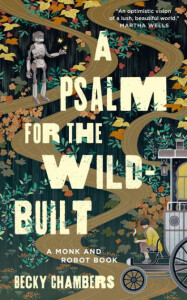 Becky Chamber’s A Psalm for the Wild-Built is wonderful. A short volume in what is labelled as hopepunk, it succeeds in drawing the reader to what feels a fully thought out and developed setting. It is a slim volume, not outstaying its welcome nor focusing more than the reader needs upon any detail.
Becky Chamber’s A Psalm for the Wild-Built is wonderful. A short volume in what is labelled as hopepunk, it succeeds in drawing the reader to what feels a fully thought out and developed setting. It is a slim volume, not outstaying its welcome nor focusing more than the reader needs upon any detail.
Our lead is Dex, once brash and thoughtless, who made themself a tea-monk. The reader is given a glipse into the day to day of what this entails, and the wonderfully human thoughts of desire, bewilderment, and even appreciation. As this goes on the reader learns that a tea-monk is much like the pop culture perception of a bartender, someone who provides small comfort by listening to problems and then a chemical aid in relaxing and adjusting to the concerns in question. Mind, the chemicals in question are usually nonalcoholic; however, the parallel will be evident for those familiar with it.
The day comes when Dex starts to find themself less than fulfilled, and attempts to solve this problem by going in search of a long-lost retreat referenced to in a recording of crickets.
On his trip he meets a Robot, one named Mosscap. Robots have long since separated from human society in a relatively peaceful manner. Both are rather surprised to meet one another, and feel at least slightly inferior to the task. The experience of Dex is the primary focus, likely sensible given that the reader is already familiar with the character. It is learned that Mosscap is tasked with learning the needs of humanity as a whole, and wishes to begin with Dex.
The two agree to make the trip together, allowing Mosscap to learn about Dex, and Dex to have safer passage with someone more experienced in the many different oddities of the wilds outside of urban lands. The two steadily grow an unusual friendship, learning of one another and attempting to adjust to the cultural differences (and functional reasons for them) each possesses.
The volume contains one of very few conversations about pronouns in fiction where no one gets particularly upset or argumentative. Indeed, it is one of very few works which considers the question in relation to artificial consciousness without simply mirroring current human thoughts on human pronouns. In that respect alone the volume has earned its worth as science fiction, regardless of the well thought-out post environmental disasters setting, or the details of a world following on from the awakening of artificial-construct consciousness.
There is no grand antagonist and the most evil entity to appear in the book is a slightly lazy bear. The journey has many little problems, each of which is presented as a chance for the pair to learn about the setback in their trip as opposed to to life-or-death peril.
A Psalm for the Wild-Built is a wonderfup read, and Becky Chambers a treasure for giving it to us. It will keep a reader comfortable, give them a nice warm feeling and something to think upon. This little volume is heartily recommended, and the fact it is likely to continue as a series represents a rare bright spot in a genre so often dim.
(Tor.com, 2021)
